#sustainable landscaping solutions
Text
Coastal Landscape Construction

Website: https://www.coastallandscapes.net.au
Address: Melbourne, Victoria, Australia
Coastal Landscape Construction, a boutique landscaping service based in Melbourne, specializes in bringing clients' landscaping visions to life. With 16 years of industry experience, they offer comprehensive services including garden makeovers, new entertaining areas, construction, irrigation, drainage, decking, screens, garden lighting, and paving. As registered builders, they ensure quality and reliability in every project.
Facebook: https://www.facebook.com/coastallandscapeconstruction
Instagram: https://www.instagram.com/coastallandscapeconstruction/
Keywords:
residential landscaping near me
commercial landscaping near me
residential landscaping services
landscape construction near me
professional garden services
landscape project management
water feature installations
drainage systems installation
sustainable irrigation systems
sustainable landscaping solutions
contemporary landscape architecture
landscape construction services
landscape design solutions
urban oasis landscaping
sustainable landscaping near me
commercial landscaping melbourne
drainage systems near me
custom landscaping near me
landscape renovation near me
modern landscape designs
residential landscaping melbourne
outdoor entertaining areas design
water wise garden design
bespoke garden features
tree and shrub planting services
sustainable landscaping melbourne
melbourne landscaping experts
irrigation solutions for gardens
quality decking for outdoor spaces
garden screens installation
durable paving solutions
commercial landscaping projects
landscape renovation experts
custom landscaping designs
garden transformation services
expert garden planners
creative outdoor spaces design
customized garden solutions
hardscape and softscape design
eco friendly landscaping options
personalized garden makeovers
outdoor living space enhancements
indigenous plant landscaping
themed landscape installations
green roof and wall solutions
native flora landscaping
eco conscious landscape planning
vibrant flowerbed arrangements
natural stone paving options
outdoor kitchen and bbq areas
all season garden designs
garden sculptures and art
garden furniture selection
fire pit and outdoor heating solutions
seasonal garden maintenance
portsea garden makeover
melbourne outdoor entertaining areas
landscape design in portsea
irrigation solutions melbourne
drainage systems portsea
quality decking melbourne
garden screens portsea
atmospheric garden lighting in melbourne
durable paving solutions portsea
commercial landscaping portsea
landscape renovation in melbourne
custom landscaping portsea
professional garden services melbourne
innovative landscape design portsea
garden transformation portsea
landscape project management melbourne
portsea garden construction
melbourne garden renovation
outdoor lighting in portsea
melbourne garden makeover
portsea garden design
melbourne irrigation specialists
portsea drainage experts
quality decking in melbourne
paving solutions in melbourne
residential landscaping portsea
garden makeover services near me
melbourne landscaping near me
outdoor entertaining areas near me
irrigation solutions near me
quality decking near me
garden screens near me
atmospheric garden lighting near me
durable paving solutions near me
professional garden services near me
innovative landscape design near me
garden transformation near me
landscape project management near me
#residential landscaping near me#commercial landscaping near me#residential landscaping services#landscape construction near me#professional garden services#landscape project management#water feature installations#drainage systems installation#sustainable irrigation systems#sustainable landscaping solutions#contemporary landscape architecture#landscape construction services#landscape design solutions#urban oasis landscaping#sustainable landscaping near me#commercial landscaping melbourne#drainage systems near me#custom landscaping near me#landscape renovation near me#modern landscape designs#residential landscaping melbourne#outdoor entertaining areas design#water wise garden design#bespoke garden features#tree and shrub planting services#sustainable landscaping melbourne#melbourne landscaping experts#irrigation solutions for gardens#quality decking for outdoor spaces#garden screens installation
2 notes
·
View notes
Text
Coastal Landscape Construction

Website: https://www.coastallandscapes.net.au
Address: Melbourne, Victoria, Australia
Coastal Landscape Construction, a boutique landscaping service based in Melbourne, specializes in bringing clients' landscaping visions to life. With 16 years of industry experience, they offer comprehensive services including garden makeovers, new entertaining areas, construction, irrigation, drainage, decking, screens, garden lighting, and paving. As registered builders, they ensure quality and reliability in every project.
Facebook: https://www.facebook.com/coastallandscapeconstruction
Instagram: https://www.instagram.com/coastallandscapeconstruction/
Keywords:
residential landscaping near me
commercial landscaping near me
residential landscaping services
landscape construction near me
professional garden services
landscape project management
water feature installations
drainage systems installation
sustainable irrigation systems
sustainable landscaping solutions
contemporary landscape architecture
landscape construction services
landscape design solutions
urban oasis landscaping
sustainable landscaping near me
commercial landscaping melbourne
drainage systems near me
custom landscaping near me
landscape renovation near me
modern landscape designs
residential landscaping melbourne
outdoor entertaining areas design
water wise garden design
bespoke garden features
tree and shrub planting services
sustainable landscaping melbourne
melbourne landscaping experts
irrigation solutions for gardens
quality decking for outdoor spaces
garden screens installation
durable paving solutions
commercial landscaping projects
landscape renovation experts
custom landscaping designs
garden transformation services
expert garden planners
creative outdoor spaces design
customized garden solutions
hardscape and softscape design
eco friendly landscaping options
personalized garden makeovers
outdoor living space enhancements
indigenous plant landscaping
themed landscape installations
green roof and wall solutions
native flora landscaping
eco conscious landscape planning
vibrant flowerbed arrangements
natural stone paving options
outdoor kitchen and bbq areas
all season garden designs
garden sculptures and art
garden furniture selection
fire pit and outdoor heating solutions
seasonal garden maintenance
portsea garden makeover
melbourne outdoor entertaining areas
landscape design in portsea
irrigation solutions melbourne
drainage systems portsea
quality decking melbourne
garden screens portsea
atmospheric garden lighting in melbourne
durable paving solutions portsea
commercial landscaping portsea
landscape renovation in melbourne
custom landscaping portsea
professional garden services melbourne
innovative landscape design portsea
garden transformation portsea
landscape project management melbourne
portsea garden construction
melbourne garden renovation
outdoor lighting in portsea
melbourne garden makeover
portsea garden design
melbourne irrigation specialists
portsea drainage experts
quality decking in melbourne
paving solutions in melbourne
residential landscaping portsea
garden makeover services near me
melbourne landscaping near me
outdoor entertaining areas near me
irrigation solutions near me
quality decking near me
garden screens near me
atmospheric garden lighting near me
durable paving solutions near me
professional garden services near me
innovative landscape design near me
garden transformation near me
landscape project management near me
#residential landscaping near me#commercial landscaping near me#residential landscaping services#landscape construction near me#professional garden services#landscape project management#water feature installations#drainage systems installation#sustainable irrigation systems#sustainable landscaping solutions#contemporary landscape architecture#landscape construction services#landscape design solutions#urban oasis landscaping#sustainable landscaping near me#commercial landscaping melbourne#drainage systems near me#custom landscaping near me#landscape renovation near me#modern landscape designs#residential landscaping melbourne#outdoor entertaining areas design#water wise garden design#bespoke garden features#tree and shrub planting services#sustainable landscaping melbourne#melbourne landscaping experts#irrigation solutions for gardens#quality decking for outdoor spaces#garden screens installation
1 note
·
View note
Text
#At Refrigerant Center INC#we specialize in providing comprehensive refrigerant solutions tailored to meet the diverse needs of our clients. With a deep understanding#Ventilation#and Air Conditioning) industry and its evolving regulatory landscape#we are committed to offering environmentally responsible refrigerant products and services.#Our company prides itself on being a trusted partner for businesses operating in various sectors#including commercial#industrial#and residential. Whether you're a facility manager#HVAC contractor#or equipment manufacturer#we have the expertise and resources to fulfill your refrigerant requirements efficiently and affordably.#Key Services and Products:#Refrigerant Sales: We offer a wide range of refrigerant products#including traditional HFCs (Hydrofluorocarbons)#low-GWP (Global Warming Potential) alternatives like HFOs (Hydrofluoroolefins)#and natural refrigerants such as CO2 and ammonia. Our extensive inventory ensures that clients can find the right refrigerant for their spe#Refrigerant Reclamation: Recognizing the importance of sustainability#we provide refrigerant reclamation services aimed at recovering#purifying#and reprocessing used refrigerants. Through our state-of-the-art reclamation facilities#we help clients minimize environmental impact while maximizing cost savings.#Regulatory Compliance Assistance: Navigating the complex regulatory landscape surrounding refrigerants can be challenging. Our team stays u#national#and international regulations#including EPA (Environmental Protection Agency) regulations in the United States.#Technical Support: We understand that proper handling and usage of refrigerants are critical for the safety and efficiency of HVAC systems.#training#and educational resources to assist clients in handling refrigerants safely and effectively.#Customized Solutions: Every client has unique requirements
3 notes
·
View notes
Text
The Future of Renewable Energy: Innovations and Trends
Introduction
The need for sustainable energy solutions has reached an unprecedented level of importance.. As global demand for energy continues to rise, the need for renewable energy sources becomes increasingly urgent. Renewable energy not only offers a cleaner alternative to fossil fuels but also promises to meet our energy needs sustainably. In this article, we at TechtoIO explore the future of renewable energy, focusing on the latest innovations and trends driving this vital sector forward. Read to continue link
#Innovation Insights#Tagsenergy storage solutions#future of renewable energy#green hydrogen#grid modernization#hydrogen energy#microgrids#renewable energy#renewable energy benefits#renewable energy challenges#renewable energy future#renewable energy innovations#renewable energy investment#renewable energy landscape#renewable energy policies#renewable energy technologies#renewable energy trends#solar technology#sustainable energy solutions#Best Fitness Gadgets to Boost Your Workout Routine#Technology#Science#business tech#Adobe cloud#Trends#Nvidia Drive#Analysis#Tech news#Science updates#Digital advancements
1 note
·
View note
Video
youtube
The State of Nature Tech - Lucy Almond Keynote at #Bloom23
#youtube#State of Nature Tech#Technology Trends#Environmental Innovation#Sustainable Solutions#Future of Tech#Nature-inspired Design#Eco-friendly Innovations#Sustainability Conference#Tech for a Better Planet#Innovation in Nature#Future Tech Landscape#Eco-conscious Technology
1 note
·
View note
Text
Harnessing Efficiency and Sustainability: The Multi-Plate Screw Press Revolution
Introduction:
In the realm of wastewater treatment and sludge dewatering, the multi-plate screw press has emerged as a transformative technology, offering a highly efficient and sustainable solution to the challenges posed by traditional methods. This innovative press has become a key player in enhancing dewatering processes across various industries, optimizing resource utilization, and minimizing environmental impact.
Understanding the Multi-Plate Screw Press:
The Multi-Plate Screw Press is a mechanical sludge dewatering technology designed to efficiently remove water content from sludge, resulting in a higher solid content and reduced volume. The system comprises multiple filtration plates with alternating fixed and movable rings, forming a series of channels for sludge dewatering.
Operational Mechanism:
The press operates on a continuous process where sludge is fed into the system and the screw gradually transports it through the plates. As the sludge progresses, the pressure increases, causing water to be expelled through the gaps between the plates. This mechanism ensures a consistent and reliable dewatering process, yielding dry, cake-like sludge with minimal water content.
Key Advantages of a Multi-Plate Screw Press:
a. High Efficiency: The press achieves high levels of dewatering efficiency, leading to a significant reduction in sludge volume. This not only facilitates easier disposal but also lowers transportation costs.
b. Compact Design: Compared to conventional dewatering equipment, the Multi-Plate Screw Press boasts a compact design, making it suitable for installations with space constraints. It offers a space-efficient solution without compromising on performance.
c. Energy Efficiency: The system requires lower energy input compared to other dewatering methods, contributing to reduced operational costs and a smaller environmental footprint. The screw press operates with low-speed rotation, minimizing wear and tear.
d. Minimal Maintenance: The design simplicity of the multi-plate screw press translates into reduced maintenance requirements. The robust construction ensures durability, and the wear-and-tear components are easily replaceable, resulting in a longer operational lifespan.
e. Odor Control: The dewatering process of the Multi-Plate Screw Press is enclosed, preventing the release of unpleasant odors associated with sludge treatment. This feature enhances its applicability in urban environments and areas sensitive to odor issues.
Applications Across Industries:
The versatility of the Multi-Plate Screw Press makes it applicable across various industries, including municipal wastewater treatment, food and beverage, pulp and paper, and industrial wastewater treatment. Its adaptability to different sludge types and consistency make it a valuable asset in diverse operational settings.
Environmental Sustainability:
As societies increasingly focus on sustainable practices, the Multi-Plate Screw Press aligns with these goals by optimizing resource utilization and minimizing environmental impact. Its energy efficiency, reduced chemical usage, and ability to produce a drier sludge contribute to a more sustainable approach to sludge management.
#The Multi-Plate Screw Press represents a paradigm shift in sludge dewatering#offering a compelling combination of efficiency#compact design#and environmental sustainability. As industries and municipalities seek innovative solutions for wastewater treatment#this technology stands out as a beacon of progress#reshaping the landscape of sludge management for a more sustainable future.
0 notes
Text
HDPE Pond liner
Introducing our high-quality HDPE Pond Liner – a robust and reliable solution for creating durable water containment systems. As a leading manufacturer specializing in pond liners, we take pride in delivering top-notch products designed to meet the diverse needs of agricultural, environmental, and landscaping applications. Our HDPE (High-Density Polyethylene) Pond Liner is crafted using state-of-the-art manufacturing processes, ensuring exceptional strength, flexibility, and longevity. The material is carefully selected for its resistance to UV rays, punctures, and environmental stressors, making it an ideal choice for lining ponds, reservoirs, and various water storage facilities.
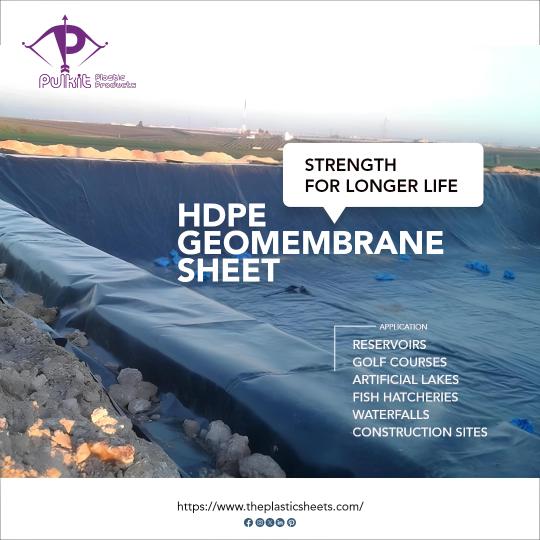
#HDPE Pond Liner#Water Containment#Pond Construction#Liner Solutions#Environmental Protection#WaterproofingAgricultureReservoir Liner#Landscape Design#Water Conservation#Custom Pond Liner#High-Density Polyethylene#UV Resistant Liner#Leak Prevention#Flexible Pond Liner#Farming Solutions#Pond Management#Durable Water Storage#Geomembrane#Sustainable Water Solutions
0 notes
Text
youtube
Bringing "Balloons Over Broadway" to Life - A Live Camera Project in Green Screen by DoInk
In the enchanting world of children's literature, "Balloons Over Broadway" by Melissa Sweet is a beloved tale that unfolds during the Macy's Thanksgiving Day Parade. You can make the story come to life with the magic of green screen technology. In this video tutorial blog post, we'll guide you through the process of creating a Live Camera Project in Green Screen by DoInk, where you can integrate your students, their balloons or both into the pages of "Balloons Over Broadway" and let their imagination take flight.
By combining the magic of the Green Screen by DoInk app with the enchanting pages of "Balloons Over Broadway," you can create an immersive experience that brings the story to life. Whether you're a teacher looking to engage your students or a storyteller aiming to captivate your audience, this project opens up a world of creative possibilities. Step into the pages of "Balloons Over Broadway" and let your imagination soar like the parade balloons themselves.
#[A] versatile#easy-to-use movie maker yields great results#Chroma Key#Balloons Over Broadway#Default (GPT-3.5)#User#Brainstorm 5 episode ideas for my new podcast on urban design.#ChatGPT#Certainly! Here are five episode ideas for your podcast on urban design:#“The Evolution of City Planning: From Ancient Times to Modern Metropolises”#In this episode#explore the history of urban design#tracing the development of cities from ancient civilizations to contemporary urban landscapes. Discuss key milestones#influential architects#and how historical urban planning concepts still impact cities today.#“Sustainable Cities: Innovations in Green Urban Design”#Dive into the world of sustainable urban design and its importance in combating climate change. Feature interviews with urban planners#architects#and sustainability experts to discuss green building practices#renewable energy solutions#and sustainable transportation initiatives in cities worldwide.#“The Future of Urban Mobility: Smart Cities and Transportation Trends”#Explore the intersection of urban design and transportation. Discuss the rise of smart cities#advancements in public transit#the impact of autonomous vehicles#and how technology is shaping the way we move within urban environments.#“Urban Renewal and Gentrification: Balancing Development and Community Preservation”#Del#Check out our new Green Screen Tutorial on how to make a photo in Green Screen by Doink#I'm sorry for any confusion
0 notes
Text
Growing Lemons in Phoenix and Tucson, Arizona
Citrus fruits have long been a staple in the horticultural tapestry of low desert regions, their vibrant hues and invigorating aromas adding a touch of Mediterranean charm to the arid landscapes. Among these sun-soaked oases, the cultivation of lemons emerges as a particularly enticing endeavor. The twin cities of Phoenix and Tucson, cradled by the embrace of the Sonoran Desert, offer an…

View On WordPress
#Citrus Cultivation#Citrus diseases#Culinary creations#Desert landscapes#Fertilization#Frost Protection#Gardening Tips#Gardening wisdom#Harvesting lemons#Homegrown lemons#Horticultural harmony#Lemon trees#Lemon varieties#Low desert gardening#Organic solutions#pest control#phoenix#Pruning techniques#Resilient gardening#Sustainable practices#Tucson
0 notes
Text
From Waste to Wealth: Transforming Trash into Sustainable Success
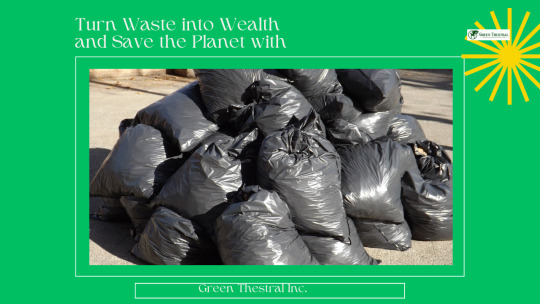
In a world grappling with environmental concerns and limited resources, the concept of "waste to wealth" holds tremendous promise. Waste, once perceived as a burden, is now recognized as a potential asset that can be transformed into a valuable resource. From recycling and upcycling to innovative technologies, this article explores the various ways in which we can turn waste into wealth, promoting sustainable practices and economic growth.
The Power of Recycling
Recycling has become a household term, but its significance cannot be overstated. By collecting and processing waste materials such as plastic, paper, glass, and metal, we can divert them from landfills and give them a new life. The recycling industry not only reduces the strain on our planet's resources but also creates employment opportunities and contributes to the circular economy. Governments and businesses worldwide are investing in recycling infrastructure and raising awareness to maximize the potential of waste recycling.
Upcycling: Adding Value to Discarded Materials
While recycling focuses on breaking down waste materials, upcycling takes a different approach by transforming them into products of higher value. Instead of downgrading the material, upcycling adds creativity and innovation to turn waste into desirable and unique items. From repurposing old furniture to creating fashion accessories from discarded textiles, upcycling has gained popularity as a sustainable alternative to conventional manufacturing. This practice not only reduces waste but also fosters creativity and entrepreneurial opportunities.
Innovative Technologies for Waste Management
Advancements in technology have revolutionized waste management, offering exciting possibilities for a greener and more sustainable future. One groundbreaking technology that has gained significant attention is waste-to-energy conversion. This process involves transforming organic waste into valuable biogas or biofuels through various techniques such as anaerobic digestion and pyrolysis.
Anaerobic digestion is a biological process that breaks down organic waste in the absence of oxygen, producing biogas as a byproduct. The organic waste, such as food scraps, agricultural residues, and sewage sludge, is placed in an enclosed tank where anaerobic bacteria decompose the waste and generate methane-rich biogas. This biogas can then be used as a renewable energy source for electricity generation, heating, or even as a vehicle fuel. The remaining digestate, which is a nutrient-rich residue, can be utilized as a natural fertilizer for agriculture, closing the loop on waste management.
Pyrolysis is another waste-to-energy conversion process that involves heating organic waste in the absence of oxygen, resulting in the production of biochar, bio-oil, and syngas. Biochar is a stable carbon-rich material that can enhance soil fertility and carbon sequestration, while bio-oil and syngas can be utilized as energy sources. This process can be applied to various types of organic waste, including agricultural residues, forestry waste, and even certain types of plastics.
The waste-to-energy conversion technologies not only offer a sustainable solution for waste management but also contribute to the production of renewable energy. By diverting organic waste from landfills, these processes help reduce greenhouse gas emissions, as landfilling organic waste leads to the release of methane, a potent greenhouse gas. Furthermore, the utilization of biogas and biofuels as energy sources helps decrease reliance on fossil fuels, mitigating the negative impacts of climate change and supporting the transition to a low-carbon economy.
While waste-to-energy conversion primarily focuses on organic waste, technology is also advancing to address the challenges posed by non-recyclable plastics. Traditional recycling methods often face limitations when it comes to certain plastics, such as multilayered packaging and mixed plastics that are difficult to separate and process. To tackle this issue, innovative technologies like plasma gasification and chemical recycling are being explored.
Plasma gasification is a high-temperature process that converts solid waste, including non-recyclable plastics, into a synthetic gas known as syngas. This syngas can be further utilized as a source of energy or as a chemical feedstock for the production of various materials. The process employs extremely high temperatures generated by an electric arc or plasma torch, breaking down the waste into its elemental components.
Chemical recycling, also known as advanced recycling or feedstock recycling, involves breaking down plastics into their molecular building blocks through various chemical processes. These building blocks can then be used as raw materials to produce new plastics, reducing the demand for virgin fossil fuel-based plastics. Chemical recycling has the potential to address the challenges posed by mixed plastics, post-consumer plastics, and plastics that are difficult to recycle through traditional mechanical processes.
By exploring and implementing these innovative waste management technologies, we can significantly reduce waste generation, minimize environmental pollution, and create valuable resources. Waste-to-energy conversion technologies provide a sustainable alternative to conventional waste disposal methods, generating renewable energy and reducing greenhouse gas emissions. Additionally, plasma gasification and chemical recycling offer solutions to the challenges posed by non-recyclable plastics, fostering a more circular economy and reducing reliance on fossil fuels.
As technology continues to advance and awareness of environmental issues grows, it is crucial to support and invest in these innovative waste management solutions. Collaboration between governments, businesses, and individuals is vital to drive the adoption of these technologies, promote sustainable practices, and pave the way for a greener and more sustainable future. By harnessing the power of technology, we can transform waste into wealth, mitigate environmental impacts, and build a more resilient planet for generations to come.
The Circular Economy Approach
The circular economy is an economic system that aims to minimize waste generation and maximize resource utilization. It emphasizes the concept of "closing the loop" by designing products that are durable, repairable, and recyclable. Through practices like product life extension, sharing economy models, and responsible consumption, the circular economy reduces the extraction of raw materials and promotes the efficient use of existing resources. By adopting a circular approach, businesses can not only reduce waste and costs but also enhance their brand reputation and contribute to environmental preservation.
Waste Management as a Business Opportunity
The transition from waste to wealth has opened up new avenues for entrepreneurs and innovators. Startups are emerging in various sectors, focusing on waste management and resource recovery. From companies that convert food waste into fertilizer to those that produce eco-friendly packaging materials, these businesses demonstrate the potential for profit while addressing environmental challenges. Governments and investors are supporting these ventures, recognizing their ability to create jobs, drive economic growth, and contribute to a sustainable future.
Community Engagement and Education
Creating a sustainable future requires collective action, and community engagement plays a crucial role. Education and awareness campaigns can help change people's attitudes and behaviors towards waste management. By promoting responsible consumption, waste segregation, and recycling practices, individuals can actively participate in the waste-to-wealth movement. Community initiatives, such as local recycling centers, composting programs, and upcycling workshops, provide platforms for collaboration and knowledge-sharing. Together, we can build a more sustainable and prosperous society.
Conclusion
The waste-to-wealth concept holds immense potential for addressing environmental challenges and creating economic opportunities. By embracing recycling, upcycling, and innovative technologies, we can transform waste into valuable resources, reduce landfill burden, and mitigate the depletion of natural resources. The circular economy approach and the rise of waste management startups further demonstrate the viability of turning waste into a profitable enterprise. However, achieving lasting change requires collective efforts, community engagement, and continuous education. Let us seize the opportunity to turn waste into wealth and build a sustainable future for generations to come.
#Waste to wealth: Transforming trash into valuable resources#Innovative waste management technologies for a sustainable future#Turning waste into renewable energy: Waste-to-energy conversion#From waste to biogas: The power of anaerobic digestion#Waste-to-energy: A greener solution for waste management#Sustainable success: Converting waste into wealth#Waste management revolution: Unlocking the potential of technology#Waste-to-energy technologies: A pathway to a circular economy#Pyrolysis: Transforming organic waste into biofuels#Plasma gasification: Tackling non-recyclable plastics for a greener future#Chemical recycling: Reshaping the plastic waste landscape#Waste-to-energy: A sustainable approach to waste management#Waste transformation: From burden to economic opportunity#Recycling and upcycling: Building wealth from waste#Waste management innovations: Redefining sustainable practices#Waste-to-wealth revolution: Creating value from discarded materials#Turning waste into resources: A roadmap to sustainability#Waste conversion technologies: Bridging the gap between waste and wealth#Waste-to-energy solutions: Powering a greener tomorrow#Sustainable waste management: Embracing the waste-to-wealth concept#Upcycling for a prosperous future: Redefining waste utilization#Waste-to-energy advancements: Paving the way for a circular economy#Waste-to-wealth strategies: Maximizing resource efficiency#Transforming waste into valuable commodities: The future of waste management#Waste conversion technologies: Innovations for a sustainable world#Waste-to-wealth practices: Shaping a more prosperous society#Waste management reimagined: Harnessing technology for a greener planet#Turning waste into renewable resources: The power of waste-to-energy#Circular economy and waste transformation: A pathway to sustainable growth#Waste-to-wealth initiatives: Driving economic and environmental benefits
0 notes
Text
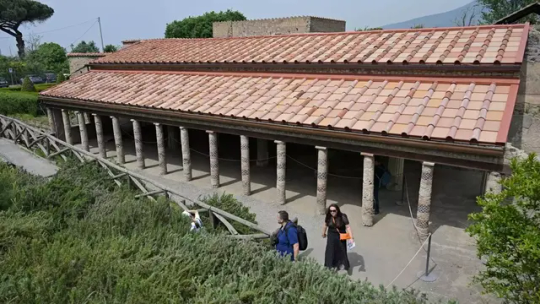
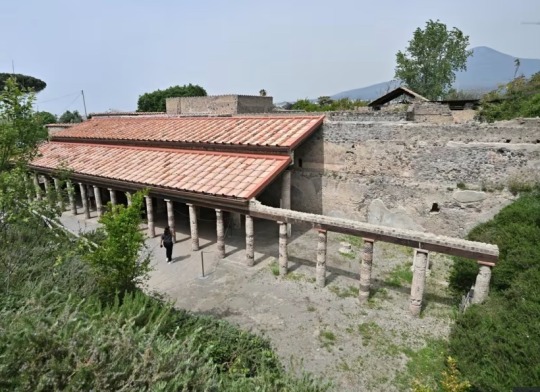
‘Ancient Roman’ Solar Roof Tiles Power Pompeii Villa
Ancient Roman ruins at Pompeii have been fitted with invisible solar panels, in a move that will contribute to the archaeological site’s sustainability efforts and cut costs. The innovative panels, which blend into the background by imitating traditional materials, were installed on the House of Cerere, on a thermopolium — a Roman snack bar — and on the House of the Vettii, which recently reopened following 20 years of restoration work.
“They look exactly like the terracotta tiles used by the Romans, but they produce the electricity that we need to light the frescoes,” said Gabriel Zuchtriegel, the director of the archaeological park of Pompeii, in a press release.
Each year, 3.5 million tourists explore the vast ruins of the ancient Roman city, which was buried by the eruption of Mount Vesuvius in 79 AD. But due to Pompeii’s size, energy bills are expensive and conventional methods of providing power across the site can threaten its appearance.

“Pompeii is an ancient city which in some spots is fully preserved,” Zuchtriegel said. “Since we needed an extensive lighting system, we could either keep consuming energy, leaving poles and cables around and disfiguring the landscape, or choose to respect it and save millions of euros.” The new technology will help the archaeological site to cut energy bills and make it more enjoyable, he added.
The invisible solar panels — or “traditional PV tiles” as they are technically known — were created by the Italian company Dyaqua. They can be designed to appear like stone, wood, concrete or brick, and hidden on walls, floors and roofs, according to Elisabetta Quagliato, whose family owns Dyaqua, in the press statement.
“We are an archaeological site but we also want to be a real-life lab for sustainability and the valorization of intangible heritage,” Zuchtriegel said. “Our initiative is not merely symbolic. Through the million tourists who visit us every year, we want to send a message to the world: cultural heritage can be managed differently and in a more sustainable way.”


Other locations in Italy using the invisible solar technology are the commune of Vicoforte in Italy and, soon, Rome’s contemporary art museum Maxxi. Public buildings in Evora, Portugal, and Split, Croatia will also install the panels, according to the press statement.
Pompeii’s recent use of these panels is just the beginning, Zuchtriegel said. “From now on, we will be taking this solution into account for all future renovation and restoration projects.”
By Garry Shaw.

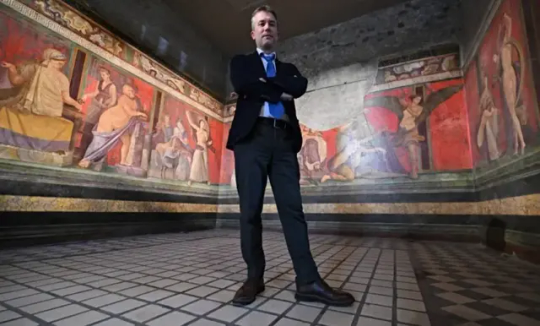

#‘Ancient Roman’ Solar Roof Tiles Power Pompeii Villa#House of Cerere#House of the Vettii#thermopolium#terracotta tiles#solar power#frescoes#mount vesuvius#ancient artifacts#archeology#archeolgst#history#history news#ancient history#ancient culture#ancient civilizations#roman history#roman empire#roman art
282 notes
·
View notes
Text
I'm not super favorable about "insects as sustainably farmed food" because I feel like it obscures the nature of the global food crisis.
We aren't anywhere close to a hard limit on the amount of food we can produce or the amount of people we can feed.
But our economic system keeps human labor forces that work on farms in dire poverty and sterilizes the landscape of smallholder farms that grow a variety of crops and cultivars while maintaining natural biodiversity, replacing them with vast monocultures and factory farms that replace human labor and sustainable practices with machinery and mass application of pesticides/herbicides/antibiotics/etc
The goal of the system is to consolidate as much wealth at the top of a pyramid of extracting wealth from land and labor, and this means farming ought to be consolidated under the control of Corporation, so the "solutions" considered to be viable are just those that simplify farming down to "input raw materials-> output Product" as much as possible. Most of the multitude of foods we can raise or grow sustainably require decentralized, personalized human labor to some extent, knowledgeable humans who are actually present and active in their relationship with the ecosystem
but our economic system sees the optimal way as "Dump corn into Facility-> Get sellable product." Farming as a way to convert land area and an investment of machinery and chemicals into Profit.
basically, insects are more factory-farmable than anything we have now and that's why they're considered such a good option as a sustainable food source
599 notes
·
View notes
Text
The removal of dams from PNW rivers is one of the best ways to help salmon survive. We've seen in multiple cases where aquatic ecosystems have rebounded even faster than expected once a dam is removed and the water is allowed to flow naturally. This isn't just beneficial to local and regional ecology, but to indigenous communities who have relied on the salmon since time immemorial.
Yes, hydroelectric dams have provided clean energy for decades, which often makes getting rid of them a tough sell, both for people concerned about energy stability in general, and those wanting to reduce reliance on fossil fuels. However, we have other options that have less impact; windmills are increasing on the Western landscape, and a study a few years ago showed that solar power could replace the capacity of existing hydroelectric dams using a fraction of the space.
Are there details to iron out? Of course. While windmills are not the massive killers of birds and bats that the fossil fuel industry tries to paint them as, we do need to address the existing wildlife mortality--and people are already doing just that. Solar panels also need to be carefully placed, and materials sourced and recycled as sustainably as possible.
But when compared to the massive amount of resources used to build and maintain hydroelectric dams, and the immense negative impact on salmon and their aquatic ecosystems, wind and solar power are much better options for the long-term, especially if we keep putting effort into solving the problems of environmental impact, energy storage, and overall sustainability. The fact of the matter is that ANY form of energy we create is going to have some negative effects on the planet. But we can choose to engage in as much damage control as possible, and focus on solutions that take both human energy needs AND the rest of nature into account.
#hydroelectric dams#salmon#sustainability#clean energy#climate change#wildlife#animals#nature#environment#conservation#environmentalism#ecology#Pacific Northwest#North America#PNW#endangered species#extinction
186 notes
·
View notes
Text
RideBoom Revolutionizes Transportation with Innovative Solutions and Unmatched Convenience

RideBoom India is expanding its innovative ridesharing services to 20 more cities across India. Providing affordable, eco-friendly transportation options to the masses.
RideBoom, the leading transportation service provider, is proud to announce its commitment to revolutionizing the transportation industry with innovative solutions and unmatched convenience for riders and drivers alike.
Unmatched Convenience
RideBoom is dedicated to providing unmatched convenience compared to other transportation services. With the RideBoom app, users can easily book a car, taxi, or delivery service right from their mobile devices. The app connects users with nearby drivers or couriers, allowing them to get to their destination or receive their deliveries quickly and efficiently.
Innovative Solutions
RideBoom is constantly innovating to provide the best possible experience for its users. The company has recently expanded its Bike Taxi Service to additional cities, offering an eco-friendly and efficient mode of transportation for short-distance travel. RideBoom is also exploring the integration of electric vehicles into its fleet, demonstrating its commitment to sustainability and the EV revolution.
Commitment to Safety and Reliability
At the core of RideBoom's mission is a dedication to providing safe and reliable transportation services. The company has implemented stringent safety measures and training protocols to ensure that its drivers and couriers deliver a secure and comfortable experience for all users.
Transforming the Ride-Hailing Industry
RideBoom's innovative approach and unwavering commitment to customer satisfaction have positioned the company as a leader in the transportation industry. By continuously introducing new features and adapting to changing market conditions, RideBoom is redefining the way people and goods move, ultimately transforming the ride-hailing landscape.
"RideBoom is committed to revolutionizing the transportation industry and providing our users with the best possible experience," said the RideBoom founder. "We are excited to continue innovating and expanding our services to meet the evolving needs of our customers."
For more information about RideBoom India and its services, please visit https://rideboom.com/india/
About RideBoom India
RideBoom India is the leading ridesharing platform in the country, providing affordable, convenient, and eco-friendly transportation solutions to commuters across India. Founded in 2020, the company has experienced rapid growth and now operates in many cities, connecting passengers with a network of verified drivers. RideBoom India is committed to revolutionizing the way people commute and contributing to a more sustainable future.
#rideboom#delhi rideboom#biketaxi#ola cabs#uber driver#rideboom taxi app#rideboom app#uber taxi#uber#ola
44 notes
·
View notes
Text
Pluto in Aquarius: Brace for a Business Revolution (and How to Ride the Wave)
The Aquarian Revolution
Get ready, entrepreneurs and financiers, because a seismic shift is coming. Pluto, the planet of transformation and upheaval, has just entered the progressive sign of Aquarius, marking the beginning of a 20-year period that will reshape the very fabric of business and finance. Buckle up, for this is not just a ripple – it's a tsunami of change. Imagine a future where collaboration trumps competition, sustainability dictates success, and technology liberates rather than isolates. Aquarius, the sign of innovation and humanitarianism, envisions just that. Expect to see:
Rise of social impact businesses
Profits won't be the sole motive anymore. Companies driven by ethical practices, environmental consciousness, and social good will gain traction. Aquarius is intrinsically linked to collective well-being and social justice. Under its influence, individuals will value purpose-driven ventures that address crucial societal issues. Pluto urges us to connect with our deeper selves and find meaning beyond material gains. This motivates individuals to pursue ventures that resonate with their personal values and make a difference in the world.
Examples of Social Impact Businesses
Sustainable energy companies: Focused on creating renewable energy solutions while empowering local communities.
Fair-trade businesses: Ensuring ethical practices and fair wages for producers, often in developing countries.
Social impact ventures: Addressing issues like poverty, education, and healthcare through innovative, community-driven approaches.
B corporations: Certified businesses that meet rigorous social and environmental standards, balancing profit with purpose.
Navigating the Pluto in Aquarius Landscape
Align your business with social impact: Analyze your core values and find ways to integrate them into your business model.
Invest in sustainable practices: Prioritize environmental and social responsibility throughout your operations.
Empower your employees: Foster a collaborative environment where everyone feels valued and contributes to the social impact mission.
Build strong community partnerships: Collaborate with organizations and communities that share your goals for positive change.
Embrace innovation and technology: Utilize technology to scale your impact and reach a wider audience.
Pluto in Aquarius presents a thrilling opportunity to redefine the purpose of business, moving beyond shareholder value and towards societal well-being. By aligning with the Aquarian spirit of innovation and collective action, social impact businesses can thrive in this transformative era, leaving a lasting legacy of positive change in the world.
Tech-driven disruption
AI, automation, and blockchain will revolutionize industries, from finance to healthcare. Be ready to adapt or risk getting left behind. Expect a focus on developing Artificial Intelligence with ethical considerations and a humanitarian heart, tackling issues like healthcare, climate change, and poverty alleviation. Immersive technologies will blur the lines between the physical and digital realms, transforming education, communication, and entertainment. Automation will reshape the job market, but also create opportunities for new, human-centered roles focused on creativity, innovation, and social impact.
Examples of Tech-Driven Disruption:
Decentralized social media platforms: User-owned networks fueled by blockchain technology, prioritizing privacy and community over corporate profits.
AI-powered healthcare solutions: Personalized medicine, virtual assistants for diagnostics, and AI-driven drug discovery.
VR/AR for education and training: Immersive learning experiences that transport students to different corners of the world or historical periods.
Automation with a human touch: Collaborative robots assisting in tasks while freeing up human potential for creative and leadership roles.
Navigating the Technological Tsunami:
Stay informed and adaptable: Embrace lifelong learning and upskilling to stay relevant in the evolving tech landscape.
Support ethical and sustainable tech: Choose tech products and services aligned with your values and prioritize privacy and social responsibility.
Focus on your human advantage: Cultivate creativity, critical thinking, and emotional intelligence to thrive in a world increasingly reliant on technology.
Advocate for responsible AI development: Join the conversation about ethical AI guidelines and ensure technology serves humanity's best interests.
Connect with your community: Collaborate with others to harness technology for positive change and address the potential challenges that come with rapid technological advancements.
Pluto in Aquarius represents a critical juncture in our relationship with technology. By embracing its disruptive potential and focusing on ethical development and collective benefit, we can unlock a future where technology empowers humanity and creates a more equitable and sustainable world. Remember, the choice is ours – will we be swept away by the technological tsunami or ride its wave towards a brighter future?
Decentralization and democratization
Power structures will shift, with employees demanding more autonomy and consumers seeking ownership through blockchain-based solutions. Traditional institutions, corporations, and even governments will face challenges as power shifts towards distributed networks and grassroots movements. Individuals will demand active involvement in decision-making processes, leading to increased transparency and accountability in all spheres. Property and resources will be seen as shared assets, managed sustainably and equitably within communities. This transition won't be without its bumps. We'll need to adapt existing legal frameworks, address digital divides, and foster collaboration to ensure everyone benefits from decentralization.
Examples of Decentralization and Democratization
Decentralized autonomous organizations (DAOs): Self-governing online communities managing shared resources and projects through blockchain technology.
Community-owned renewable energy initiatives: Local cooperatives generating and distributing clean energy, empowering communities and reducing reliance on centralized grids.
Participatory budgeting platforms: Citizens directly allocate local government funds, ensuring public resources are used in line with community needs.
Decentralized finance (DeFi): Peer-to-peer lending and borrowing platforms, bypassing traditional banks and offering greater financial autonomy for individuals.
Harnessing the Power of the Tide:
Embrace collaborative models: Participate in co-ops, community projects, and initiatives that empower collective ownership and decision-making.
Support ethical technology: Advocate for blockchain platforms and applications that prioritize user privacy, security, and equitable access.
Develop your tech skills: Learn about blockchain, cryptocurrencies, and other decentralized technologies to navigate the future landscape.
Engage in your community: Participate in local decision-making processes, champion sustainable solutions, and build solidarity with others.
Stay informed and adaptable: Embrace lifelong learning and critical thinking to navigate the evolving social and economic landscape.
Pluto in Aquarius presents a unique opportunity to reimagine power structures, ownership models, and how we interact with each other. By embracing decentralization and democratization, we can create a future where individuals and communities thrive, fostering a more equitable and sustainable world for all. Remember, the power lies within our collective hands – let's use it wisely to shape a brighter future built on shared ownership, collaboration, and empowered communities.
Focus on collective prosperity
Universal basic income, resource sharing, and collaborative economic models may gain momentum. Aquarius prioritizes the good of the collective, advocating for equitable distribution of resources and opportunities. Expect a rise in social safety nets, universal basic income initiatives, and policies aimed at closing the wealth gap. Environmental health is intrinsically linked to collective prosperity. We'll see a focus on sustainable practices, green economies, and resource sharing to ensure a thriving planet for generations to come. Communities will come together to address social challenges like poverty, homelessness, and healthcare disparities, recognizing that individual success is interwoven with collective well-being. Collaborative consumption, resource sharing, and community-owned assets will gain traction, challenging traditional notions of ownership and fostering a sense of shared abundance.
Examples of Collective Prosperity in Action
Community-owned renewable energy projects: Sharing the benefits of clean energy production within communities, democratizing access and fostering environmental sustainability.
Cooperatives and worker-owned businesses: Sharing profits and decision-making within companies, leading to greater employee satisfaction and productivity.
Universal basic income initiatives: Providing individuals with a basic safety net, enabling them to pursue their passions and contribute to society in meaningful ways.
Resource sharing platforms: Platforms like carsharing or tool libraries minimizing individual ownership and maximizing resource utilization, fostering a sense of interconnectedness.
Navigating the Shift
Support social impact businesses: Choose businesses that prioritize ethical practices, environmental sustainability, and positive social impact.
Contribute to your community: Volunteer your time, skills, and resources to address local challenges and empower others.
Embrace collaboration: Seek opportunities to work together with others to create solutions for shared problems.
Redefine your own path to prosperity: Focus on activities that bring you personal fulfillment and contribute to the collective good.
Advocate for systemic change: Support policies and initiatives that promote social justice, environmental protection, and equitable distribution of resources.
Pluto in Aquarius offers a unique opportunity to reshape our definition of prosperity and build a future where everyone thrives. By embracing collective well-being, collaboration, and sustainable practices, we can create a world where abundance flows freely, enriching not just individuals, but the entire fabric of society. Remember, true prosperity lies not in what we hoard, but in what we share, and by working together, we can cultivate a future where everyone has the opportunity to flourish.
#pluto in aquarius#pluto enters aquarius#astrology updates#astrology community#astrology facts#astro notes#astrology#astro girlies#astro posts#astrology observations#astropost#astronomy#astro observations#astro community#business astrology#business horoscopes
109 notes
·
View notes
Text
A new study launched this week highlights the work of Andhra Pradesh Community-Managed Natural Farming (APCNF) and the remarkable untapped potential of agroecological natural farming in Andhra Pradesh, India.
Spanning over 6 million hectares, and involving 6 million farmers and 50 million consumers, the APCNF represents the largest agroecological transition in the world. Amidst the diverse landscapes of Andhra Pradesh, this state-wide movement is addressing a multitude of development challenges—rural livelihoods, access to nutritious food, biodiversity loss, climate change, water scarcity, and pollution—and their work is redefining the way we approach food systems.
Farmers practicing agroecology have witnessed remarkable yield increases. Conventional wisdom suggests that chemical-intensive farming is necessary to maintain high yields. But this study shows agroecological methods were just as productive, if not more so: natural inputs have achieved equal or higher yields compared to the other farming systems—on average, these farms saw an 11% increase in yields—while maintaining higher crop diversity. This significant finding challenges the notion that harmful chemicals are indispensable for meeting the demands of a growing population.
The advantages of transitioning to natural farming in Andhra Pradesh have gone beyond just yields. Farmers who used agroecological approaches received higher incomes as well, while villages that used natural farming had higher employment rates. Thanks to greater crop diversity in their farming practice, farmers using agroecology had greater dietary diversity in their households than conventional farmers. The number of ‘sick days’ needed by farmers using natural farming was also significantly lower than those working on chemically-intensive farms. Another important finding was the significant increase in social ‘capital’: community cohesion was higher in natural farming villages, and knowledge sharing had greatly increased—significantly aided by women. The implications for these findings are significant: community-managed natural farming can support not just food security goals, but also sustainable economic development and human development.
The study overall sheds light on a promising and optimistic path toward addressing geopolitical and climate impacts, underlining the critical significance of food sovereignty and access to nourishing, wholesome food for communities. Contrary to the misconception that relentlessly increasing food production is the sole solution to cater to a growing population, the truth reveals a different story.
While striving for higher yields remains important, the root cause of hunger worldwide does not lie in scarcity, as farmers already produce more than enough to address it. Instead, food insecurity is primarily driven by factors such as poverty, lack of democracy, poor distribution, a lack of post-harvest handling, waste, and unequal access to resources.
153 notes
·
View notes